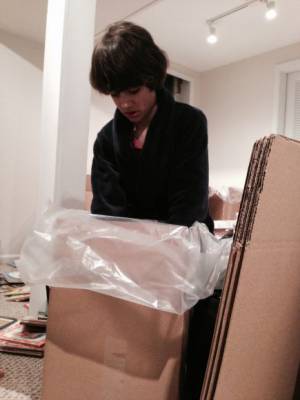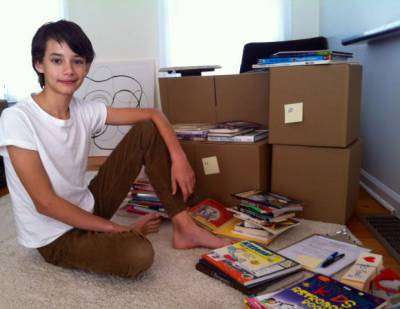Spencer Ames, while in 6th grade at The School at Columbia University, led a book drive for Swaziland that enriched his life while enriching the lives of others. His story is inspiring for parents who are seeking a volunteer project for their family that builds compassion, a broadened worldview and leadership skills. His school is a K-8 school in New York City for children of Columbia University employees and those from the local community. With the cooperation of his school and friends nearby, he built a community of support to complete a book drive, gathering over 1,000 books for Encabeneni Primary School in Swaziland. In November 2014, Spencer spoke at TEDxYouth about how he grew from his experience with ALP. This blog is a transcript of his inspiring and heartfelt speech.
“Let me ask you to picture a school-aged child. Happy. Smart. Curious. They’re eager to learn. And they have teachers eager to help them. But one important thing is missing from the picture … books! There is nothing for this child to read. No books to curl up with. No pages to flip through.
This is the situation many children in parts of Sub-Saharan Africa face, through no fault of their own. They are eager to learn and they want desperately to read. But they do not have access to books that can feed their interests.
This is the problem that the African Library Project tries to solve.
Today, I’d like to tell you more about the African Library Project, or ALP for short, and my experience with it.
The African Library Project is a non-profit organization based in the US that acts as a middleman between communities in Africa … and volunteers from the US who gather donated books. The ALP helps get books from a place where they are plentiful to countries like Ghana, Sierra Leone, and Swaziland, where they can have a huge impact. Most African children grow up without books. Access to books is critical to increasing literacy … and literacy can help create a path out of poverty.
African Library Project volunteers are assigned a school and are asked to collect 1,000 used books and raise about $500 for shipping. Once the volunteer completes their portion of the project, the ALP forwards the boxes of books to Africa by container ship.
Finally, the books arrive in Africa and the ALP coordinates their delivery and the creation of a new school library. This is the last step in the project … but it is really the first step in the impact the project has.
In 9 years, the African Library Project has helped create over 1,400 libraries in 10 African countries, donating over 1.5 million books!
That’s a short review of the African Library Project.

Let’s turn to my own experience. I have been privileged to be surrounded by books for as long as I can remember. I loved having my parents read to me as a child. And I have enjoyed reading on my own ever since.
My mother, an epic librarian, has always been a supporter of literacy and libraries. I have inherited her passion. When she and I were looking for a community service project and we came across the African Library Project, we knew it was something we had to do!

So, during the summer of last year, we signed on with the ALP to begin a project. We were matched with a primary school in Luyengo, Swaziland. We got to work raising funds and collecting books from various sources, including my preschool, libraries, book fairs, and many people including families at The School at Columbia. Fellow students at The School also contributed by making bookmarks, adding their own messages for the children of Swaziland.

First is the feeling of having helped make a difference in the lives of some who are less fortunate. We are all incredibly fortunate. I think we have a responsibility to give back and help where we can.
My second reflection is that I was really amazed by the response from people, including those at The School at Columbia. It was really wonderful to see our community step up. I believe that many people are ready to help a good cause. Sometimes, you just need to ask.
Finally, I want to say that this has been a learning experience for me. A large part of that has come from communicating about the project to others, including making presentations like this one. While my real motivation was to try to help others through this project, I’ve grown as a person as a result of the work I’ve done.

I hope that this story might inspire people to do what they can to make others’ lives better. And I think they will find, as I did, that enriching others’ lives ends up enriching your own.”

